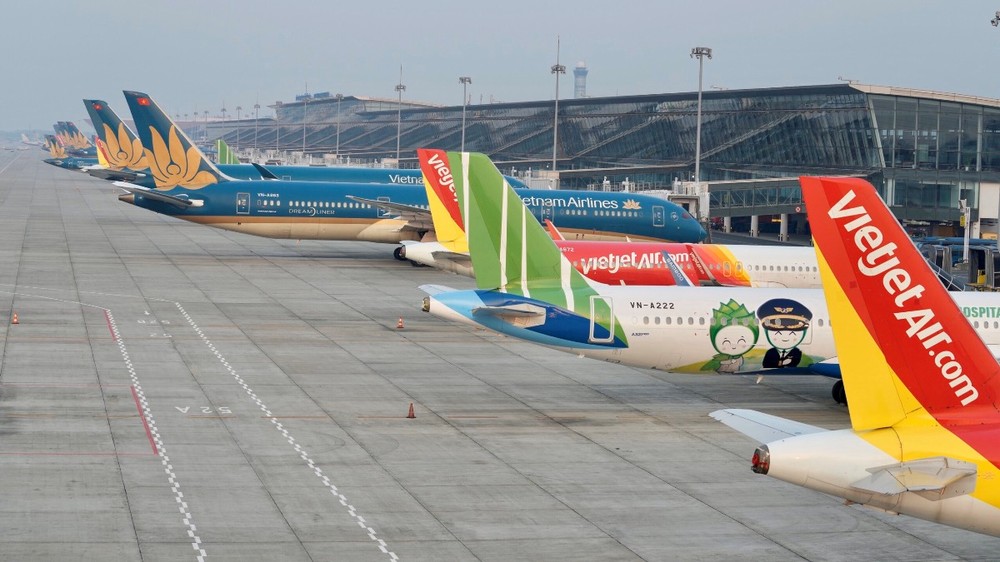In the first four months of 2024, domestic flight ticket prices in Vietnam have shown a significant increase compared to the same period last year. The Vietnam Civil Aviation Authority recently released a report explaining the reasons behind this surge and proposed measures to regulate flight ticket prices.

According to the report submitted to the Ministry of Transport, average economy-class ticket prices (including taxes and fees) on several domestic routes operated by Vietnamese airlines have risen compared to 2023. However, these prices still adhere to the prescribed service transport price ranges.
For instance, on the Hanoi-Ho Chi Minh City route, Vietnam Airlines’ average ticket price is approximately 2.64 million VND (a 14% increase from 2023), Vietjet Air around 1.74 million VND (a 25% increase), Bamboo Airways about 2 million VND (an 11% increase), and Vietravel Airlines approximately 1.5 million VND (a 15% increase).
On routes from Hanoi and Ho Chi Minh City to Da Nang, Vietnam Airlines’ average ticket price is around 1.8 million VND (increased by 17-26%), Vietjet about 1.3-1.5 million VND (increased by 32-38%), Bamboo Airways about 1.3-1.6 million VND (increased by 13-29%), and Vietravel Airlines about 1.1-1.4 million VND (increased by 14-20%).
Compared to the maximum regulated price on these routes (2.89 million VND, excluding taxes and fees), these average ticket prices range from 38.1% (Vietravel Airlines) to 62.3% (Vietnam Airlines).

On the Hanoi-Phu Quoc route, Vietnam Airlines’ average ticket price is about 2.7 million VND (a 13.8% increase), while Vietjet’s is approximately 1.8 million VND (a 49.6% increase). Compared to the regulated price (4 million VND, excluding taxes and fees), these average ticket prices range from 45% (Vietjet) to 68% (Vietnam Airlines).
For the Hanoi-Nha Trang route, Vietnam Airlines’ average ticket price is about 2 million VND (a 7% increase), Vietjet around 1.55 million VND (a 39% increase), and Bamboo Airways about 1.45 million VND (a 3% increase). Compared to the regulated price (3.4 million VND, excluding taxes and fees), these average ticket prices range from 42.6% (Bamboo Airways) to 60.8% (Vietnam Airlines), with Vietjet at 45.7%.
During the April 30th – May 1st holiday period, there was a significant increase in air travel demand. According to the Vietnam Civil Aviation Authority, passengers who booked early managed to secure tickets at lower price ranges, whereas those booking closer to the flight dates paid higher fares.
The Vietnam Civil Aviation Authority attributes the ticket price increases to global trends affecting airlines worldwide. These include higher fuel prices, foreign exchange rate fluctuations, Pratt & Whitney engine recalls impacting global fleet availability, delayed receipt of new aircraft, and increased aircraft maintenance costs.
Specifically, updated International Air Transport Association (IATA) data indicates that Jet-A1 fuel prices in Asia were 100.25 USD per barrel on April 26th. The Vietnam Civil Aviation Authority estimates that fuel costs for airlines increased by 56.55% compared to December 2014 and 74.27% compared to September 2015 due to Jet A1 price fluctuations and USD/VND exchange rate changes.
Moreover, a 1,300 VND increase in the USD/VND exchange rate during Q1 2024 (equivalent to 5.6% compared to 2019) led to additional operating costs of approximately 823 billion VND. The average exchange rate in Q2 2024 increased operating costs by 23 million VND per flight.

Additionally, operational costs for airlines, including aircraft leasing fees and international flight operation charges, primarily paid in USD, have increased.
As of May 2nd, Vietnamese airlines operate a total of 199 aircraft, a decrease of 32 compared to 2023. The actual number of operational aircraft fluctuates between 165 and 170, down by approximately 40-45 aircraft compared to the average number in 2023 due to extensive engine checks and repairs.
Extended engine maintenance periods have also affected aircraft operations. Previously 75 days in 2019, maintenance periods have now increased to 140-160 days, with some cases extending up to 365 days. In Vietnam, these engines are used on some A321NEO aircraft operated by Vietnam Airlines and Vietjet, leading to some aircraft being temporarily grounded in 2024 and 2025.
Aircraft acquisition plans for airlines in 2024 have been affected. Vietjet Air will not acquire any additional aircraft, while Vietnam Airlines plans to receive only two Boeing 787 aircraft in June-July 2024. Other airlines have also reported challenges in securing leased aircraft according to their plans.
The reduced domestic transport capacity due to fewer aircraft and supply-demand imbalances have contributed significantly to the fluctuation in ticket prices. This situation is expected to continue during the peak summer season of 2024, especially affecting flights to tourist destinations and resorts.
To mitigate negative impacts on operations and meet passenger air travel demand, the Vietnam Civil Aviation Authority has implemented measures to increase flight frequencies and enhance nighttime operations at airports with adequate conditions. Adjustments in takeoff and landing slot parameters are also being made to facilitate efficient airline operations, increase flight frequencies, and ensure adequate supply on domestic routes.
Given current concerns about rising flight ticket prices, the Vietnam Civil Aviation Authority advises passengers to plan their travel early, purchase tickets through official sales channels, and stay informed about airlines’ operational plans to make timely adjustments and choose reasonable ticket prices.
In cases where passengers face ticket prices higher than regulations or encounter issues affecting their rights during air transport service use, passengers are encouraged to report to the Vietnam Civil Aviation Authority, regional airport authorities, or relevant state management agencies for prompt resolution.
This detailed overview captures the complexity of factors influencing domestic flight ticket prices in Vietnam and the proactive steps taken by the Vietnam Civil Aviation Authority to manage these challenges effectively.





